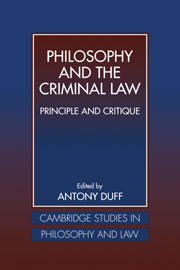Book contents
- Frontmatter
- Contents
- List of Contributors
- Introduction
- 1 Contingency, Coherence, and Conceptualism: Reflections on the Encounter between ‘Critique’ and ‘the Philosophy of the Criminal Law’
- 2 Does Criminal Liability Require an Act?
- 3 ‘Simulacra of Morality’? Beyond the Ideal/Actual Antinomies of Criminal Justice
- 4 Principle and Contradiction in the Criminal Law: Motives and Criminal Liability
- 5 On the General Part of the Criminal Law
- Index
Introduction
Published online by Cambridge University Press: 17 September 2009
- Frontmatter
- Contents
- List of Contributors
- Introduction
- 1 Contingency, Coherence, and Conceptualism: Reflections on the Encounter between ‘Critique’ and ‘the Philosophy of the Criminal Law’
- 2 Does Criminal Liability Require an Act?
- 3 ‘Simulacra of Morality’? Beyond the Ideal/Actual Antinomies of Criminal Justice
- 4 Principle and Contradiction in the Criminal Law: Motives and Criminal Liability
- 5 On the General Part of the Criminal Law
- Index
Summary
The invitation to edit a collection of new essays on philosophy and the criminal law aroused both excitement and anxiety. The past three decades have seen an upsurge of interest among both philosophers and lawyers in philosophical issues connected with the criminal law – perhaps more in Britain than in the United States. This was clearly related, within academic philosophy, to the revival of political and social philosophy; and, among lawyers, to the strengthening of more theoretical perspectives on the criminal law informed by a range of other disciplines, including philosophy. Against this background, the prospect of editing such a volume was exciting, but it also aroused anxiety about how such a volume should be focused, given the wealth of possible topics that could plausibly be included.
I made three editorial decisions that helped to determine the shape and contents of this collection. The first was to interpret ‘philosophy’ in a generously inclusive sense. I would look for essays that would take a theoretical and critical – as opposed to, for instance, a purely empirical or doctrinal – perspective on the criminal law, without worrying too much about whether the writers or their essays would count as ‘philosophical’ in a narrow professional sense. But as well as considering substantive theoretical issues connected to the criminal law, the essays should also have something to say about the very enterprise of theorising, or philosophising, about the criminal law.
- Type
- Chapter
- Information
- Philosophy and the Criminal LawPrinciple and Critique, pp. 1 - 8Publisher: Cambridge University PressPrint publication year: 1998
- 1
- Cited by

